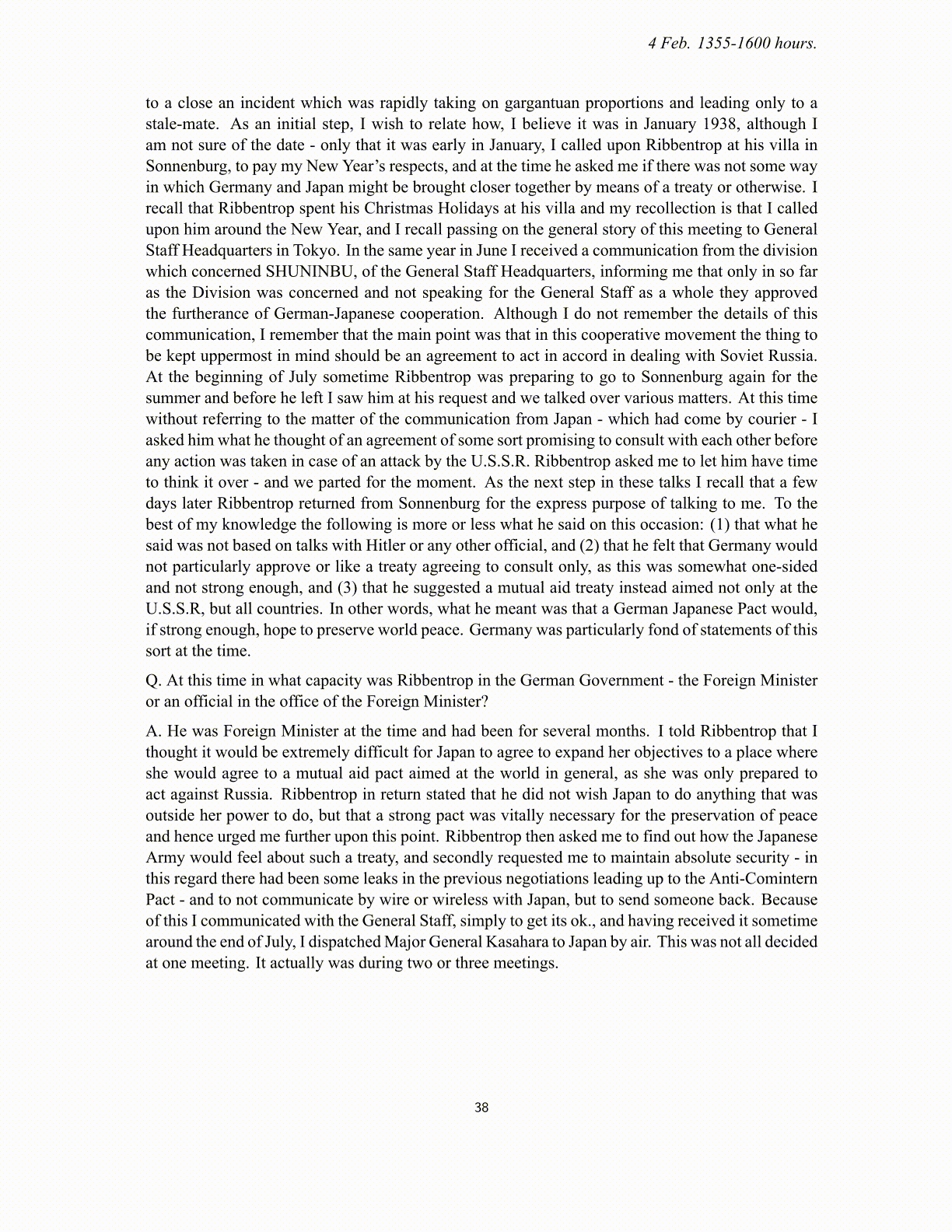
4 Feb. 1355-1600 hours. to a close an incident which was rapidly taking on gargantuan proportions and leading only to a stale-mate. As an initial step, I wish to relate how, I believe it was in January 1938, although I am not sure of the date - only that it was early in January, I called upon Ribbentrop at his villa in Sonnenburg, to pay my New Year’s respects, and at the time he asked me if there was not some way in which Germany and Japan might be brought closer together by means of a treaty or otherwise. I recall that Ribbentrop spent his Christmas Holidays at his villa and my recollection is that I called upon him around the New Year, and I recall passing on the general story of this meeting to General Staff Headquarters in Tokyo. In the same year in June I received a communication from the division which concerned SHUNINBU, of the General Staff Headquarters, informing me that only in so far as the Division was concerned and not speaking for the General Staff as a whole they approved the furtherance of German-Japanese cooperation. Although I do not remember the details of this communication, I remember that the main point was that in this cooperative movement the thing to be kept uppermost in mind should be an agreement to act in accord in dealing with Soviet Russia. At the beginning of July sometime Ribbentrop was preparing to go to Sonnenburg again for the summer and before he left I saw him at his request and we talked over various matters. At this time without referring to the matter of the communication from Japan - which had come by courier - I asked him what he thought of an agreement of some sort promising to consult with each other before any action was taken in case of an attack by the U.S.S.R. Ribbentrop asked me to let him have time to think it over - and we parted for the moment. As the next step in these talks I recall that a few days later Ribbentrop returned from Sonnenburg for the express purpose of talking to me. To the best of my knowledge the following is more or less what he said on this occasion: (1) that what he said was not based on talks with Hitler or any other official, and (2) that he felt that Germany would not particularly approve or like a treaty agreeing to consult only, as this was somewhat one-sided and not strong enough, and (3) that he suggested a mutual aid treaty instead aimed not only at the U.S.S.R, but all countries. In other words, what he meant was that a German Japanese Pact would, if strong enough, hope to preserve world peace. Germany was particularly fond of statements of this sort at the time. Q. At this time in what capacity was Ribbentrop in the German Government - the Foreign Minister or an official in the office of the Foreign Minister? A. He was Foreign Minister at the time and had been for several months. I told Ribbentrop that I thought it would be extremely difficult for Japan to agree to expand her objectives to a place where she would agree to a mutual aid pact aimed at the world in general, as she was only prepared to act against Russia. Ribbentrop in return stated that he did not wish Japan to do anything that was outside her power to do, but that a strong pact was vitally necessary for the preservation of peace and hence urged me further upon this point. Ribbentrop then asked me to find out how the Japanese Army would feel about such a treaty, and secondly requested me to maintain absolute security - in this regard there had been some leaks in the previous negotiations leading up to the Anti-Comintern Pact - and to not communicate by wire or wireless with Japan, but to send someone back. Because of this I communicated with the General Staff, simply to get its ok., and having received it sometime around the end of July, I dispatched Major General Kasahara to Japan by air. This was not all decided at one meeting. It actually was during two or three meetings. 38